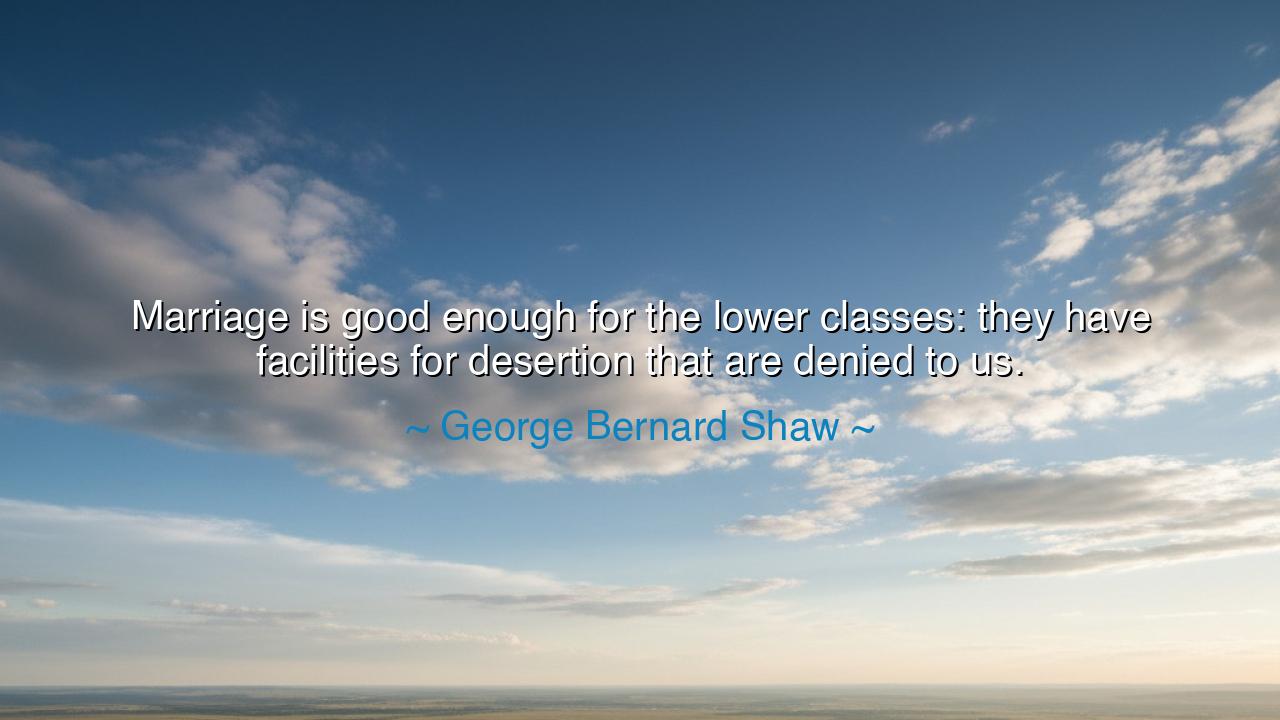
Marriage is good enough for the lower classes: they have
Marriage is good enough for the lower classes: they have facilities for desertion that are denied to us.






O children of the future, gather closely and hear the words of George Bernard Shaw, a man whose wit and wisdom echo through time: "Marriage is good enough for the lower classes: they have facilities for desertion that are denied to us." These words, though spoken in jest, carry with them a sharp truth that cuts to the heart of the human condition—the tension between duty and freedom, between the bonds of commitment and the desire for escape. Shaw speaks not just of the institution of marriage, but of the inequalities that govern it, and the deep complexities of human relationships.
What Shaw draws our attention to here is the stark contrast between the lower classes and those who hold power in society. For the common people, the ties of marriage may seem both sacred and unbreakable, yet they are afforded a kind of freedom in the form of desertion, a means of escape that the powerful do not possess. It is a subtle critique of the privileges that wealth and social standing provide—privileges that, at times, can bind the elite to a system they can neither alter nor escape, while the lower classes, bound by fewer societal constraints, may have more means of liberation.
Let us turn to the ancient world, where marriage was seen as a sacred bond that could not easily be broken, particularly for those of noble birth. In the great Roman Empire, marriage was often seen as a political tool, a means to solidify alliances and secure power. But even the mighty Julius Caesar and Cleopatra, whose union was both a personal relationship and a political maneuver, knew that the pressures of duty and responsibility often outweighed the bonds of affection. Caesar, though a great general and statesman, was bound by a system that did not afford him the same freedom to leave his marriage as would be granted to those of lower standing. In this way, the nobility were constrained by their own power, unable to seek the freedom that the common man might be granted in more humble circumstances.
Shaw’s words reflect this tension, for while marriage may seem to offer security and respectability, it can also feel like a prison to those who are unwilling or unable to conform to its rigid expectations. In many ways, those who are wealthy and powerful are not freer but are bound in different ways. Their marriages are not simply personal decisions but have the weight of political, social, and economic considerations. This makes escape—whether through desertion or dissolution—a far more difficult and socially impossible task. The privilege of leaving a marriage, once entered into for reasons other than love, is not easily granted to the upper classes, making their bonds more burdensome than liberating.
Consider the story of Queen Elizabeth I of England, a monarch who chose never to marry, despite the expectations placed upon her. Throughout her reign, Elizabeth faced pressure from many corners of society to secure a marriage that would solidify her political power. Yet, she chose instead to remain single, understanding that marriage would tie her to obligations that could prevent her from ruling with the autonomy she desired. Her decision was one of sacrifice—for though she avoided the constraints of marriage, she also faced the isolation and loneliness that came with ruling alone. Elizabeth’s example shows us that, like Shaw’s critique, the weight of marriage does not always fall equally; the powerful may be bound by it in ways that the common people are not.
The lesson that Shaw imparts here, O children, is one of freedom and equality. Marriage, in its most sacred form, is a bond that can empower and unite, but it is also a structure that can enslave those who are not free to choose or to leave. To those in power, marriage can often feel like a trap, a binding of duties and obligations that may prevent the pursuit of personal happiness or autonomy. The common person, however, while bound by fewer resources and expectations, may find a kind of freedom in desertion that the powerful cannot. This is not an argument against marriage itself but a critique of the unequal ways in which it operates across different classes.
Thus, O children, I urge you to understand that in the choices we make, we must always seek balance and freedom. Marriage should never be a prison, nor should it be a mere political tool. When you enter into any bond—whether of love or duty—remember that it is the strength of your commitment that will make it meaningful. Yet, remember also that the freedom to leave, when necessary, is just as important as the choice to stay. Marriage must be a union built on mutual respect and understanding, not one enforced by external pressures or the constraints of society.
Let this wisdom guide you, O children: Marriage is a sacred union, but it must not be entered into lightly, nor should it be used to hold anyone captive. Seek relationships where both parties can grow and be free, where both are respected and empowered. And in all things, may you live with the understanding that true freedom comes from the ability to choose, to stay when you wish, and to leave when you must, all in the spirit of honesty, love, and mutual respect.






AAdministratorAdministrator
Welcome, honored guests. Please leave a comment, we will respond soon